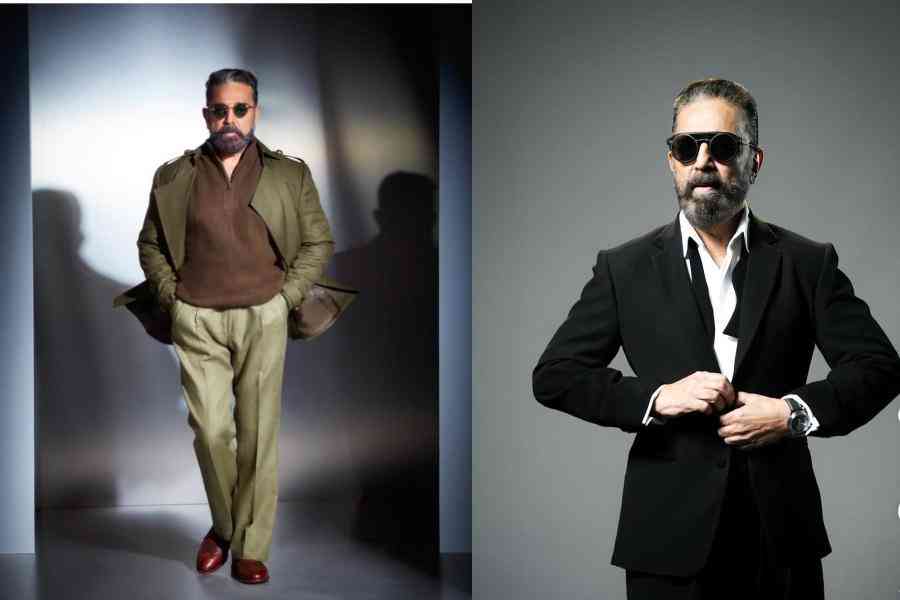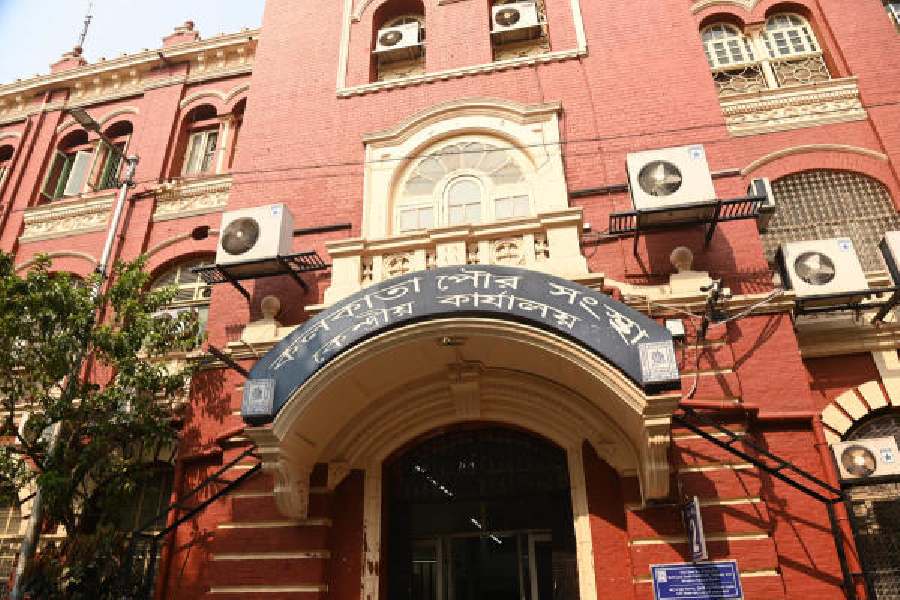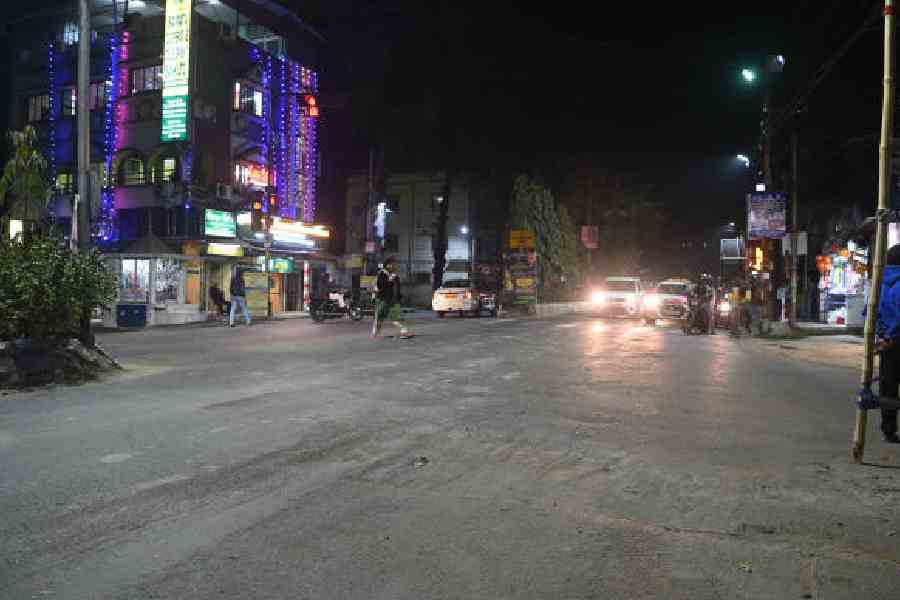Kamal Haasan and I commence this conversation in the most quotidian way possible — he complains about the sweltering heat in Chennai, I do the same about Calcutta; he laments the bumper-to-bumper traffic situation in Chennai, I do the same about Calcutta; a mention of the not-so-well-maintained roads in his hometown comes up, I add my two bits on the crumbling roads in the city that I now call home. There is a refreshing relatability to the man who was literally born into the movies, having acted in films for 64 of the 70 years that he has been alive.
Whatever adjective — ‘superstar’, ‘pioneer’, ‘thespian’ — you attribute to Kamal Haasan doesn’t even begin to describe this giant figure of an actor who continues to be a formidable presence on screen. For he is not a mere actor. Haasan has not only been a part of stories that have stood the test of time, he — as a director, producer and child of cinema — has pioneered sweeping change and creativity in the technical aspects of the medium, right from the early stages of his career. After introducing prosthetic make-up, digital filming formats and live sound-recording systems to Indian cinema, Haasan, at 69, took off to the US last year to study artificial intelligence, given its looming shadow over filmmaking. He forever remains a student of his craft.
“The way cinema is changing now... it is difficult to keep up,” he admits, as our banter on traffic and weather gives way to AI and other topics of relatively higher weightage. “The medium is changing now. There is no other way but to adapt to it. It is definitely not going to adapt to me, so I will need to keep adapting to it. The march is on,” he explains, reiterating his decision to understand and use AI in his cinema. At a time when his contemporaries are content to drift along, Haasan continues to challenge the status quo.
‘THE FILM INDUSTRY IS THE ONLY FAMILY I HAVE’
We are in a banquet hall in Taj Connemara in Chennai. Dressed simply in charcoal-coloured jeans teamed with a grey Balenciaga T-shirt and sporting a full beard, Haasan — born Parthasarathy Srinivasan in a middle-class household removed from cinema and its accoutrements — looks much younger than the digits in his DD/MM/YY column. While his family may not have been from the industry per se — though his siblings also took to the movies as a profession — Kamal Haasan maintains that, today, it is the film industry that constitutes his family. “I have grown up in the industry. This is my family... where else would I have found friends, relatives or lovers? I don’t know any other world,” he smiles, matter-of-factly.
In the industry, there is one man, though, who Kamal considers more than family. That is filmmaker Mani Ratnam. The two — who are also related, with Ratnam’s wife Suhasini being Haasan’s niece — have been at the core of the rich storytelling fabric of Tamil cinema (which travelled far and wide, before the term ‘pan-Indian’ was even coined).
Given the relationship — personal and professional — that they have shared, it is a surprise that they have collaborated on only two films as director and actor. Their latest — Thug Life, for which this conversation was initiated in the first place — releases worldwide in theatres on June 5. It comes 38 years after the two first put their collective craft and resources together. That was for Nayagan/Nayakan, which remains a seminal film in Indian cinema. A seemingly perfect coalesce of direction and performance, Nayakan had Kamal, then 33, playing a slum dweller whose rise to becoming a dreaded kingpin of the underworld is directly proportional to the body count he notches up. Internationally, of all the films that followed Francis Ford Coppola’s mafioso classic The Godfather, many experts of the genre have considered Nayakan among the best. A few years ago, TIME included it in its list of the “100 best films of all time”.
#THETHUGLIFE
Thug Life, as the name suggests, is set in the mobster world reminiscent of Nayakan, but both Mani Ratnam and Kamal Haasan have maintained that it is not its sequel — spiritual or otherwise. This despite a shared genre, thematic overlaps and the fact that Haasan’s character is called Sakthivelu in both films. One key difference — while Nayakan traced Velu’s rise in the more potent Bombay underworld, Thug Life has him as a Godfather-ish patriarch settled in Delhi. Tamil superstar Silambarasan TR aka STR aka Simbu plays his son, with the film boasting Trisha Krishnan and Abhirami as its female leads. Bollywood actors Pankaj Tripathi, Ali Fazal and Rohit Saraf pepper its cast.
Of the 30-odd films directed by Mani Ratnam so far, this is the first with an English title. I bring that up in my chat with Haasan, who reportedly suggested the name to Ratnam. “I didn’t coin it, of course, Tupac did,” smiles Haasan. Reference to context? American rapper Tupac Shakur’s ‘Thug Life’ is an acronym that stands for ‘The Hate U Give Little Infants F***s Everybody’. It is a phrase he used to describe the cycle of oppression and violence faced by marginalised communities, particularly African Americans. The ‘Thug Life’ concept is often misinterpreted as glorifying violence, but as Tupac, who was murdered in 1996 at the age of 25, kept reiterating, it was in fact meant to highlight the systemic issues that contribute to it.
“The title itself reveals a lot, and the characters play the constituents of that area, of that life. In this case, the family lives in Delhi, and they are thugs,” says Haasan. He adds: “Using it to describe tough heroes will also not be wrong. I am talking without gender bias because even the women in this film are heroes, in their own way.”
I ask Haasan if the definition of what constitutes toughness, in men or women, has changed in today’s times. He nods his head vigorously and says: “Women in today’s world have to be tough... there is no other way to be. They tend to be called the ‘weaker sex’ because it is comforting for men.” He also adds that he is witnessing that myopic point of view changing, starting right from the film industry itself. “We don’t call them actresses anymore... everyone is an actor, and rightfully so.”
Haasan also reiterates that the time of a single protagonist is behind us. “There can be multiple people who carry a story forward. The concept of a protagonist is no longer bound by its standard definition. Who is the protagonist in India’s fight for Independence? It is not just (Mahatma) Gandhi. It is the people of India. If you remove a cog in the wheel, the whole thing will collapse. Filmmaking, as it is in most other things in life, involves the participation of so many people.”
MANI MAGIC
No interaction with Kamal Haasan is complete without bringing up Mani Ratnam. The actor harked back to the time when both he and Ratnam didn’t have the wealth and clout they do today, but were always sure of one thing — to consistently make the kind of cinema that they would want to pay to watch. “When the two of us were not this rich and not this famous, we had promised ourselves and each other that this is the kind of cinema that we are going to make. I think, in our individual capacities, we have managed to honour that,” says Haasan.
He adds that the bond with Ratnam — who has worked with almost every big name in the acting business — remains one that has stood the test of time. “Even when we didn’t work with each other for close to four decades, it wasn’t that we didn’t allow our cinema to seep into each other. And through the years, we also worked with other people, who we are now working jointly with. Like Mani sir found (A.R.) Rahman. So many elements have coagulated to make Thug Life... I am excited to watch the film myself. We are very happy with the film we have made and we want it to reach the audiences far and wide,” he smiles.
Their equation, more than anything else, is one of friendship and respect, Haasan points out. With his trademark touch of humour, he says: “We will be embarrassed to admit it but we admire each other. Whenever I direct a film, it feels like Mani is directing and whenever he directs a film with anyone else, I know that he thinks of me. I know that for sure,” he smiles, with a twinkle in his eye.
On Thug Life, that they were witnessing something magical and that which belonged to the history books was not lost on Haasan's co-stars, who were also present in the conversation with t2oS. Simbu, who grew up with his producer-father T. Rajendar hoping and dreaming that his son would get to share screen space with Haasan one day, said: "I don't think there can be a filmmaker-actor pair like them who can do a film after so long, and still be at the top of their game like they were 40 years ago. If it was any other duo, either the actor would have fallen by the wayside or the director would have vanished by now. It is the longevity of their careers — and that too consistently at the top — which needs to be studied," summed up the 42-year-old actor.
Trisha has worked with Haasan and Ratnam on three films apiece, but a chance to be a part of their combined creative energy on Thug Life was what made her feel like she had struck gold. "We have three legends coming together in this film, including Rahman sir. Them coming together in a film which also has me in it is my little dream in my little head that became a reality," said the actor, whose last biggie, the two-part magnum opus Ponniyin Selvan, was also helmed by Ratnam.
Working with Kamal Haasan on Thug Life was a "homecoming of sorts" for Abhirami, who last shared screen space with the actor in the 2004 film Virumandi, which was also written, co-edited, produced and directed by Haasan. "I grew up in a middle-class family where watching a movie was a luxury. On the rare occasions that we watched films, they were either Kamal sir's films or Mani sir's films." She added: "Every day that I worked with Kamal sir, he gave me so may pointers. He told me: 'Why don't you approach this moment this way?" When Mani sir explains a scene to you, When Ravi K. sir (Ravi K. Chandran, cinematographer) sets a sequence and tells you that this is how the camera will follow you and this is how your axis will change... you are constantly learning. I have not gone to an acting school... this is my school. As a student of cinema, this is where I want to be all day, every day," she said.
OF GURUS AND MENTORS
The mention of mentor and student, of life as a school of cinema and of the legends of the past makes Haasan walk down memory lane organically. In this conversation, the man often meanders into other topics, but everything he says amounts to being contemporary, relatable, and, most importantly, a life lesson, one that provides serious food for thought.
He recalls his initial days as an actor — watching, learning, being pulled up but never giving up. "I remember the time when I was being directed by my guru, Mr Balachander (filmmaker K. Balachander) and I was fumbling badly in that scene. He just slapped his forehead in frustration and said: 'I actually wrote that scene with Nagesh (legendary Tamil actor) in mind'. Hearing that, I blanked out even more. I asked him if I could go to the toilet... and I actually cried in the toilet," he recalls, adding: "I came out and told Ananthu (a frequent collaborator of K. Balachander) that I couldn't be insulted like that. He actually waved me off with a flick of his hand and said: 'I will tell him to insult you again!' Ananthu was also a mentor to me. That is the kind of relationship I shared with my gurus... something that Mani and I still share."
There is nothing more pleasurable than hearing Kamal Haasan talk about his 'film family'. "I often walked in front of Sivaji sir's (Sivaji Ganesan) house hoping that one day I would be invited in. And then, he became family! Thevar Magan (a 1992 film written and produced by Kamal Haasan and starring Ganesan) was my gurudakshina to him. He got the National Award for that."
All that Haasan has received from the ones gone past is what he hopes to pass on forward. "Nagesh sir and Sivaji sir were not easy people to deal with. They were not easy with their affection, but they did show me love in abundance. That is something I have to keep passing forward to future generations of actors.
TAKE ME ON!
Haasan moves on to talking about the generations, of now and of the future, who will take on the mantle from him and his contemporaries. But he maintains that they will not have it easy from him. "I strongly believe that every actor who is acting in my film is competing with me and if he or she thinks they are not, then I will admonish them and say: 'Come, take me on'. Because that is when my performance is going to improve, and so well theirs."
We round it off by talking about the ephemeral nature of the movie business — " I have spent my years in this profession knowing that the title of the best actor... anybody else can take it away next year. So I have to be on my toes all the time," he states — and what stardom, of 60 years and counting, means to him. "I am a normal person... I get claustrophobic because of stardom. I was happy being where I was. Now that people have raised it (the pedestal), I sometimes feel like I have lost my gravity. I want to be on the ground, more than anywhere else," he smiles.
Spoken like a true actor and legend, not a superstar.










